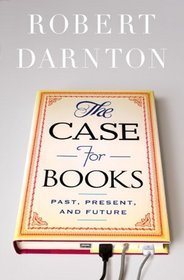The Case for Books: Past, Present, and Future isnt so much about Kindles or Nooks replacing paper books, but is instead focused on higher-order concepts such as changes in the technology of communication throughout history. Robert Darnton has worn many hats in the world of print, including that of reporter, professor of the history of books at Princeton, academic and trade editor and publisher, and most recently, director of Harvard University Library. As a retrospectively assembled collection of essays written for other occasions, there is considerable overlap, especially in the ones that discuss Google Book Search. They are curiously divided in sections going backwards from Future to Present to Past, and in my opinion get progressively more interesting. Darntons bent is academic and far from anti-digital media. I would recommend this volume to those interested in academic publishing and an introduction to the field of the history of books.
I'm having a hard time deciding what this book is more guilty of: false advertising or unreadable dryness.
If you think this is a book about the history of books and how books fit into people's lives differently in the new "eBook age", you would be wrong. As was I.
What Darnton has done here is slap together ten or so essays he had written in the past (like from 30 years ago up to 7 years ago) that sort of, kind of, have to do with the way book publishing has changed as the world moved into the Internet age, but mostly they just go off-topic to long diatribes about his favorite 18th century works or endless thoughts about Google Book Search. (Honestly, in the first half of the book I was convinced this was just a book about Google Book Search and the lawsuits attached to it.)
This book was originally published in 2009, when this mountain of information about GBS would have been up-to-date and possibly engaging. In 2015 it is already incredibly dated and uninteresting. When you throw in other articles written in the 1990s about the idea of books turning digital, it becomes a disjointed, and oftentimes discusses newspapers more than it does books themselves.
The major problem with throwing together all of these out-of-date articles, despite the fact that they sort of touch on the same subject, is that they become nothing but a repository about how one man saw the transformation of printed works move into the digital age as it happened. It creates no linear history and does not call into account a broader discussion of how these changes affected society on the whole.
I was intensely disappointed by the book and I feel almost shocked at how happy I am to be finished with it.
If you think this is a book about the history of books and how books fit into people's lives differently in the new "eBook age", you would be wrong. As was I.
What Darnton has done here is slap together ten or so essays he had written in the past (like from 30 years ago up to 7 years ago) that sort of, kind of, have to do with the way book publishing has changed as the world moved into the Internet age, but mostly they just go off-topic to long diatribes about his favorite 18th century works or endless thoughts about Google Book Search. (Honestly, in the first half of the book I was convinced this was just a book about Google Book Search and the lawsuits attached to it.)
This book was originally published in 2009, when this mountain of information about GBS would have been up-to-date and possibly engaging. In 2015 it is already incredibly dated and uninteresting. When you throw in other articles written in the 1990s about the idea of books turning digital, it becomes a disjointed, and oftentimes discusses newspapers more than it does books themselves.
The major problem with throwing together all of these out-of-date articles, despite the fact that they sort of touch on the same subject, is that they become nothing but a repository about how one man saw the transformation of printed works move into the digital age as it happened. It creates no linear history and does not call into account a broader discussion of how these changes affected society on the whole.
I was intensely disappointed by the book and I feel almost shocked at how happy I am to be finished with it.




